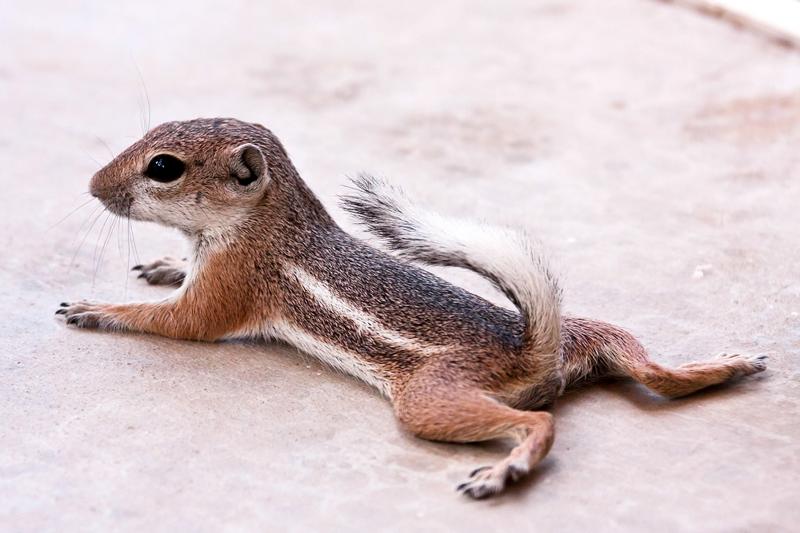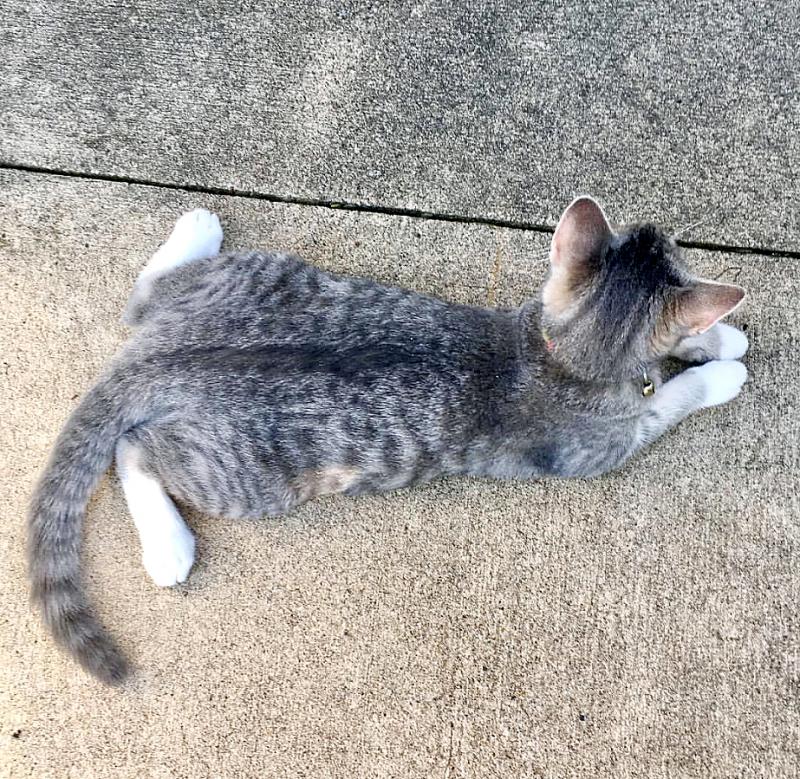It’s baking hot in New York, which can only mean one thing for the city’s small mammal population: it’s splooting season.
This week, with temperatures reaching 35 degrees Celsius, the city’s parks department urged residents not to worry about the health of squirrels seen sprawling on the ground, legs extended behind them like a person whose arms gave out halfway through a yoga class.
“On hot days, squirrels keep cool by splooting (stretching out) on cool surfaces to reduce body heat,” the department tweeted.

Photo courtesy of Pixabay
Perhaps even more remarkable than the phenomenon itself was the word the government agency used. Splooting? Is that a real thing?
The science certainly is. Squirrels’ bellies have less fur than other parts of their bodies, so splooting helps them cool down, says Dan Blumstein, a professor in the department of ecology and evolutionary biology at UCLA. It’s a popular trick among mammals, including the marmots he studies, which “on hot days will lie on rocks as it gets hot, because the boulders are still cooler,” he says.
But until recently, he says, he didn’t know the term “splooting.”

Photo courtesy of James Marvin Phelps via Flickr
“I always called it ‘doing the rug,’” he says.
DOGGO LANGUAGE
Grant Barrett, a lexicographer and co-host of the radio show A Way With Words, explains that the term comes from Doggo language, a form of canine-inspired Internet-speak that has grown into its own tongue.

Photo courtesy of Rochelle Hartman via Flickr
Typically appearing on social media with pictures of dogs, the language features an array of cutesy words including “bork” (a version of “bark”), “mlem” (a kind of tongue movement) and “pupperino” (self-explanatory).
Like squirrels and marmots, dogs sploot. Corgis, stubby legs sticking out behind them, are particularly adept at it and may deserve credit for inspiring the term — though pinpointing its exact origin may be an exercise in futility, Barrett says. “It would take you days or even a week to slog through all of the posts and comments in these [doggo-focused] groups to figure out who first said it.”
Also deserving of credit, according to Barrett: Australians. Doggo reflects “an Australian way of creating those kinds of cutesy words, and ‘doggo’ itself just seems so much like an Australian word. You can’t prove it, because this kind of stuff is loosey goosey,” Barrett says. But “if you look at the Facebook groups for this kind of language, some of the earliest ones do seem to have a lot of Australians in them.”
The earliest use of the term he could find was around 2011, which aligns with the findings of Kory Stamper, lexicographer and author of Word by Word: The Secret Life of Dictionaries. The word “didn’t have much use in printed, edited prose, however, and maintained a pretty low profile — it stayed splooted, if you will — until very recently,” she wrote in an E-mail. “It seems like newspapers and magazines discovered the sploot in about 2020.”
It might be a variation on “splat,” Stamper wrote, “and that would actually fit its pre-corgi history nicely.” Sploot “has been used in cartoons as one of those onomatopoeic sound descriptions since at least the 1950s; it seemed to be a favorite of the folks behind the Bugs Bunny comic.” It also calls to mind the word “splay,” as a caller to Barrett’s show noted.
DOES IT WORK FOR HUMANS?
Whatever the origin, the word confers a certain respect on the animals we apply it to, Barrett says.
“I think that this whole batch of language really also comes from not just your natural tendency to talk to animals in a cute way, like you would a baby, but in your natural tendency to welcome them as a thinking being,” he explains. “By naming this action that is so common among animals, you’re giving them agency.”
So are these mammals on to something? No squirrel was willing to comment on the record, so a Guardian reporter ran around the block in 32 degrees Celcius heat, then splooted on his apartment floor. While it may have been marginally cooler than remaining standing, it wasn’t particularly comfortable.
Nor was it satisfying enough to justify such socially questionable behavior, even with a shirt partially lifted to simulate the thinner belly fur Blumstein described.
But humans have our own ways of dealing with heat — such as the shower required after floor-splooting — as do other animals we might see in our neighborhoods. Birds, Blumstein notes, sometimes pant like dogs.
“They open their mouths and they sort of hunch down a little bit and their tongues are out; they don’t look very happy.”
“Clearly,” he says, “a hotter world is changing the behavior of animals.”

That US assistance was a model for Taiwan’s spectacular development success was early recognized by policymakers and analysts. In a report to the US Congress for the fiscal year 1962, former President John F. Kennedy noted Taiwan’s “rapid economic growth,” was “producing a substantial net gain in living.” Kennedy had a stake in Taiwan’s achievements and the US’ official development assistance (ODA) in general: In September 1961, his entreaty to make the 1960s a “decade of development,” and an accompanying proposal for dedicated legislation to this end, had been formalized by congressional passage of the Foreign Assistance Act. Two

Despite the intense sunshine, we were hardly breaking a sweat as we cruised along the flat, dedicated bike lane, well protected from the heat by a canopy of trees. The electric assist on the bikes likely made a difference, too. Far removed from the bustle and noise of the Taichung traffic, we admired the serene rural scenery, making our way over rivers, alongside rice paddies and through pear orchards. Our route for the day covered two bike paths that connect in Fengyuan District (豐原) and are best done together. The Hou-Feng Bike Path (后豐鐵馬道) runs southward from Houli District (后里) while the

March 31 to April 6 On May 13, 1950, National Taiwan University Hospital otolaryngologist Su You-peng (蘇友鵬) was summoned to the director’s office. He thought someone had complained about him practicing the violin at night, but when he entered the room, he knew something was terribly wrong. He saw several burly men who appeared to be government secret agents, and three other resident doctors: internist Hsu Chiang (許強), dermatologist Hu Pao-chen (胡寶珍) and ophthalmologist Hu Hsin-lin (胡鑫麟). They were handcuffed, herded onto two jeeps and taken to the Secrecy Bureau (保密局) for questioning. Su was still in his doctor’s robes at

Mirror mirror on the wall, what’s the fairest Disney live-action remake of them all? Wait, mirror. Hold on a second. Maybe choosing from the likes of Alice in Wonderland (2010), Mulan (2020) and The Lion King (2019) isn’t such a good idea. Mirror, on second thought, what’s on Netflix? Even the most devoted fans would have to acknowledge that these have not been the most illustrious illustrations of Disney magic. At their best (Pete’s Dragon? Cinderella?) they breathe life into old classics that could use a little updating. At their worst, well, blue Will Smith. Given the rapacious rate of remakes in modern